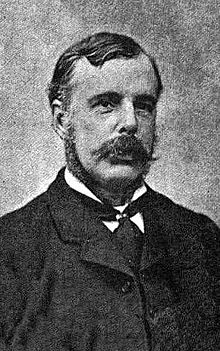Charles William Alcock
Charles William Alcock (born December 2, 1842 in Sunderland , England , † February 26, 1907 in Brighton , Sussex ) was an English football player and sports official . He was one of the decisive forces in the early development of both football and cricket and, above all, brought the FA Cup into being.
Originally born in Sunderland in the far north-east of England, Alcock moved to the south of the country at a young age. There he attended Harrow School , was very involved in the local school soccer team and founded the "Forest Football Club" with his older brother John in 1859, which played its games in Epping Forest - in north-east London - and its style of playing was known as dribbling Game “prescribed. In 1863 he was decisive for the formation of the successor club of Forest - the " Wanderers Football Club " - responsible, which consisted mainly of graduates from Harrow School ("Old Harrovians"). As a player himself, Alcock was known as a strong center forward who had an accurate shot. In his only international match, he led the English national team on March 6, 1875 against Scotland as captain and scored a goal in this game.
The sphere of influence of the Football Association ("FA") was limited in the early days to organize games between teams from different counties . This changed fundamentally when Alcock, who was then the FA association secretary, suggested on July 20, 1871 that it was desirable to set up a competition under the umbrella of the football association, to which all members of the FA should be invited . This was the birth of the world's first national football tournament, which - like the competitions at Harrow School - was based on a simple knockout system (i.e. the loser of a game in the fight for the tournament win). Fifteen teams took part in the tournament, which was held for the first time in 1872, and Alcock won it as the Wanderer's team captain.
Alcock's additional focus was also the fact that he wanted to develop the interests of the FA in Scotland and, according to the minutes of the FA meeting of October 3, 1872, made the decision to send an English team to Glasgow during the current season Game against Scotland. This resulted in the world's first international match, which took place on November 30, 1872 between England and Scotland.
It was only because of an injury that Alcock was unable to take part in the 0-0 draw at Hamilton Crescent in Partick and instead was active as one of two " umpires " who were responsible for compliance with the rules in one of the halves of the game (and later as " linesman. " “Moved behind the sidelines). The task of the English team captain fell in this game to Cuthbert Ottaway .
During his association career , which he began in 1866 in the committee of the FA and continued as secretary between 1870 and 1895, Alcock was at the end still honorary treasurer and vice-president. He was a referee of the FA Cup finals between 1875 and 1879 and also worked as a journalist , especially since 1868 he published an annual football book.
In addition to football, Alcock was very influential in cricket . From 1872 until his death in 1907 he served as the club secretary of the Surrey County Cricket Club , but only played a single first-class game without any success. As in football, he organized the first test match in England in 1880 with the game against Australia at the Kennington Oval . He founded the very successful Cricket magazine in 1882 and was the editor of the famous James Lillywhite's Cricketers' Annual .
Works
- Football: The Association Game . George Bell & Sons, London 1906 ( PDF, 3.4 MB ).
Web links
Individual evidence
| personal data | |
|---|---|
| SURNAME | Alcock, Charles William |
| ALTERNATIVE NAMES | Alcock, CW |
| BRIEF DESCRIPTION | English football player and official |
| DATE OF BIRTH | December 2, 1842 |
| PLACE OF BIRTH | Sunderland |
| DATE OF DEATH | February 26, 1907 |
| Place of death | Brighton |
